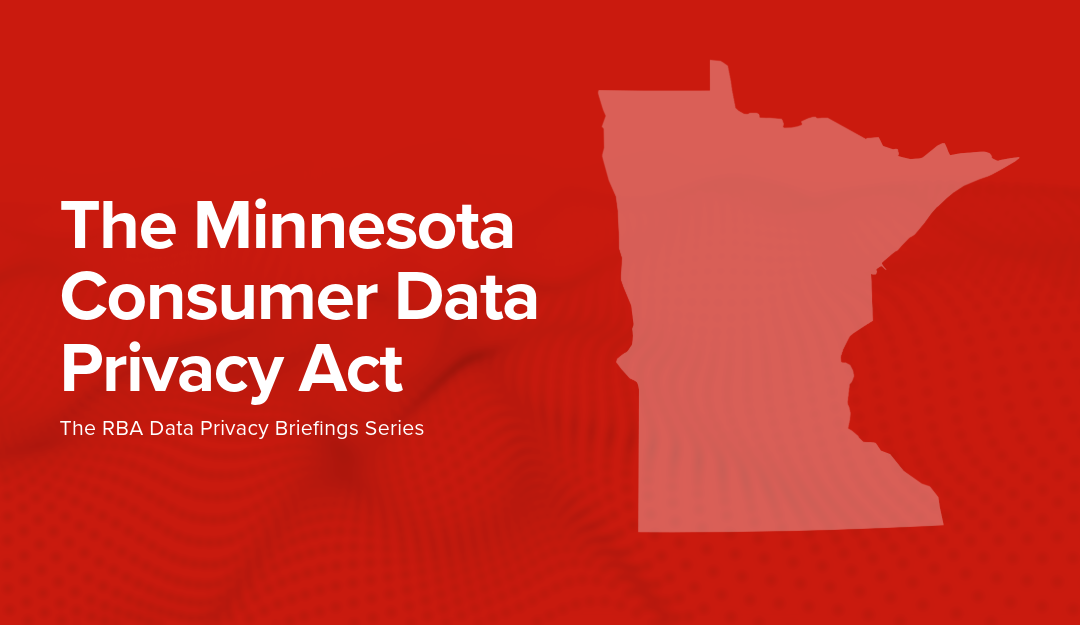The Minnesota Consumer Data Privacy Act (MCDPA) was signed into law by Governor Tim Walz on May 24, 2024, establishing comprehensive privacy protections for Minnesota residents. The law becomes effective on July 31, 2025, with postsecondary educational institutions having until July 31, 2029, to comply.
The MCDPA distinguishes itself through unique features like the right to question profiling decisions, prescriptive rules for privacy notices, and comprehensive protections for sensitive data categories. Organizations must implement robust compliance programs that address technical requirements and consumer rights while maintaining detailed documentation of their privacy practices.
Last updated on January 1, 2025
Scope and Applicability
The MCDPA applies to organizations that conduct business in Minnesota or produce products/services targeted to Minnesota residents and meet at least one threshold:
- Control/process personal data of 100,000+ consumers annually (excluding payment transactions)
- Control/process personal data of 25,000+ consumers while deriving over 25% of gross revenue from selling personal data
Exemptions include:
- Government entities and federally recognized Indian tribes
- Financial institutions subject to GLBA
- HIPAA-covered entities and business associates
- Airlines regulated by the Airline Deregulation Act
- Higher education institutions (until July 31, 2029)
- Nonprofit organizations focused on insurance fraud detection
- Small businesses (as defined by SBA, except for sensitive data sales)
- Public utilities
The law only applies to Minnesota residents acting in an individual context, not employment or commercial contexts.
Key Provisions
Consumer Rights
The MCDPA grants Minnesota consumers the right to:
- Access and confirm personal data processing
- Correct inaccuracies in their personal data
- Delete personal data
- Obtain a portable copy of their data
- Opt out of targeted advertising, data sales, and profiling
- Appeal denied requests
- Question and review automated decision-making results, including understanding the rationale and securing different decisions
Business Obligations
Under the MCDPA, controllers must:
Technical Requirements
- Display “Privacy Rights” or an equivalent link on the homepage
- Implement Universal Opt-Out Mechanisms (UOOMs)
- Respond to consumer rights requests within 45 days (one 45-day extension permitted)
- Electronically notify consumers of material privacy policy changes
- Obtain consent from consumers aged 13-16 for data sales
- Implement reasonable security measures
Documentation Requirements
- Maintain data privacy policies and procedures
- Conduct data protection assessments for high-risk processing
- Document internal appeals processes
- Keep records of consumer requests and responses
Definitions of Sensitive Data
The MCDPA defines sensitive data broadly to include the following protected categories:
- Racial/ethnic origin
- Religious beliefs
- Mental/physical health conditions
- Sexual orientation
- Citizenship/immigration status
- Biometric/genetic data
- Data of known children
- Precise geolocation data
The Act effectively establishes different consent requirements for children and teens:
- Children under 13: requires parental consent as sensitive data
- Teens 13-16: requires their own consent for targeted advertising/sales
- Individuals over 16: standard adult provisions apply
This aligns with COPPA’s definition of children as “under 13 years old” while adding additional protections for young teens that other privacy laws like GDPR (which defines children as under 16) have implemented.
Opt-In vs. Opt-Out Approach
The MCDPA generally takes a hybrid approach:
- Opt-in required for sensitive data processing
- Opt-out rights for targeted advertising and data sales
- Recognition of universal opt-out mechanisms
- Clear and conspicuous opt-out methods required
Compliance Doesn't Need to be Complicated
Is your team prepared to meet the challenges of protecting your customers' data in an ever-changing privacy & security landscape? The cost of non-compliance is growing with each new law passed. RBA can help you navigate these complexities and equip your organization with the knowledge and tools you need to be successful.
- Expertise: We stay up-to-date with the latest in domestic and international data privacy legislation
- Customized Solutions: Tailored approaches for businesses of all sizes, including those with a global footprint
- Comprehensive Support: From assessment to implementation and ongoing compliance advice
- Risk Mitigation: We'll work directly with your legal, compliance, regulatory, and security teams to help minimize your risk
Enforcement and Penalties
The Minnesota Consumer Data Privacy Act is enforced exclusively by the state’s Attorney General, who can impose civil penalties of up to $7,500 for each violation of the law. Until January 31, 2026, businesses will have a 30-day opportunity to cure any alleged violations before penalties are imposed. The law notably does not include a private right of action, meaning individual consumers cannot file lawsuits for violations. In enforcement actions, the Attorney General’s office has the authority to recover costs associated with litigation. This enforcement framework emphasizes regulatory oversight while providing businesses an initial grace period to adapt to compliance requirements.
Sources
- Minnesota Legislature – Text of HF 4747-4
- International Association of Privacy Professionals (IAPP) – Minnesota sends comprehensive privacy bill to governor
- OneTrust DataGuidance – Minnesota – Data Protection Overview
- OneTrust Resources – Minnesota joins US privacy landscape with Consumer Data Privacy Act
Disclaimer
The information provided on this website is for general informational purposes only. While we strive to keep the content accurate and up-to-date, RBA, Inc., makes no representations or warranties of any kind, express or implied, about the completeness, reliability, or suitability of the information contained on this website.
Please note that RBA, Inc., is not a law firm, and its consultants are not attorneys or legal professionals. Any advice or opinions provided are offered in good faith and should not be construed as legal advice. We strongly recommend consulting your legal, regulatory, compliance, and/or security teams before making decisions with legal implications.
RBA, Inc., disclaims any liability for any loss or damage arising out of the use of this website or reliance on its content.
About the Author

Tyler Schroeder
Managing Principal, Strategy
Tyler Schroeder is a strategist helping organizations overcome business, brand, and marketing challenges through results-driven digital solutions. Tyler has an extensive background specializing in digital strategy, data privacy, search engine optimization (SEO), analytics, and strategic planning. He has 15+ years' experience across agency and in-house teams, including Fortune 100 companies, Big Ten & Ivy League universities, mid-to-large enterprises with multi-regional footprints, and non-profits of all sizes.
Author’s Statement on the Ethical Use of AI
I openly acknowledge and take pride in the thoughtful integration of artificial intelligence tools in creating this content. This transparency reflects my commitment to ethical AI usage while delivering exceptional value to clients and visitors. I have critically assessed and validated any generated feedback. The final content, conclusions, and assertions are my own.
Tools & Applications
- Research & Content Development: Perplexity, Claude
- Quality Assurance: Grammarly
- Visual Content: Adobe Firefly
Guiding Principles
- AI tools enhance rather than replace human creativity.
- Content authenticity is maintained through personal expertise.
- Original ideas and strategic direction remain solely my own.
- Final editorial decisions reflect my professional judgment.
- All AI-generated content undergoes thorough human review.
Quality Standards
- Security: Commitment to data privacy and security
- Equity: Outputs critically reviewed to assess for bias
- Accuracy & Integrity: Independent verification ensures accuracy and authenticity
- Attribution & Transparency: Clear identification of AI assistance while maintaining originality
This acknowledgment demonstrates my dedication to responsible AI integration while maintaining the highest professional standards in service delivery.

